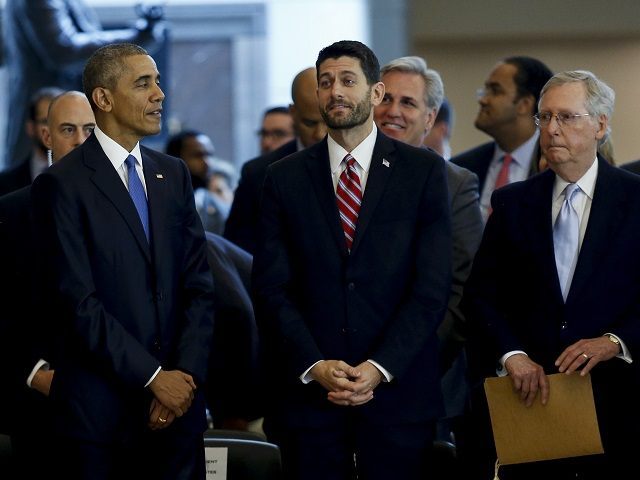The text of the Obama administration’s Trans Pacific Partnership (TPP) trade deal between the United States and 11 other countries reverses policies that were originally put into place to prevent a foreign takeover of the nation’s infrastructure, argues political consultant Curtis Ellis, who adds that the deal threatens U.S. national security interests.
Ellis explained:
Previous U.S. trade pacts stated in no uncertain terms that the national security interests of the United States are determined solely by the U.S. government and supersede any provisions of the pacts. The U.S. government had unfettered power to protect our national security interests as it deemed necessary – even if its actions might violate the terms of a trade agreement.
But the Trans-Pacific Partnership agreement reverses this precedent. As a result, other countries could claim our national security interests violate the T.P.P. agreement and force the U.S. to pay billions of dollars in damages.
Ellis says that Chapter 11 in the more than 5,000-page trade deal provides foreign investors with special rights to acquire U.S. land, businesses, natural resources and investments.
“Under Chapter 28 and Chapter 29, these foreign investors could do an end-run around U.S. courts and sue the U.S. before an international panel, known as an investor-state dispute tribunal, if they feel American law violates their ‘rights’ under the TPP,” Ellis argues.
Currently, the Committee on Foreign Investment in the United States (CFIUS) reviews pending foreign investments in the U.S. to determine if they pose a threat to national security and can recommend the president shut down investments deemed a threat. Under previous trade agreements, foreign investors would have no recourse.
But under the T.P.P., the Sultan of Brunei, the billionaire autocrat who rules his T.P.P. country under Sharia law, could sue for billions of dollars if CFIUS denied his bid to buy a company providing security to U.S. ports and airports.
He would bring his case before a foreign tribunal that could force taxpayers to award him compensation for “lost profits.” The tribunal, staffed by three unelected lawyers hailing from anywhere in the world, would have the power to second-guess the U.S. government on what constitutes a threat to our national security.
Additionally, the Islamic Sultanate of Brunei — a country that’s a party to President Obama’s trade agenda — has outlawed Christmas and threatens to place offenders in prison.
Ellis points to an event in 2006 that supports his concerns within the TPP.
According to Ellis, Dubai Ports World (DPW), an enterprise of the United Arab Emirates, sought to purchase a company in 2006, which operated six U.S. ports. During that time, Ellis says, “Congress intervened to block the sale after Coast Guard officials raised the possibility of significant security risks,” but he argues that the 2006 “controversy came in the midst of congressional debate over the U.S.-Oman Free Trade Agreement.”
Ellis’s concerns with TPP is that the TPP, like the Oman pact, gives foreign investors special rights to own and operate U.S. businesses and an option to sue if they feel their rights are violated. He adds that the public outcry in 2006 blocked the sale.
Following the Dubai Ports World controversy, language was added in a footnote to all U.S. trade agreements to shut down any second-guessing of U.S. security interests by trade tribunals. The footnote makes clear the U.S. has sole discretion in determining its essential national security interests.
The critical footnote to the “Security Exception” Article 22.2 of the Peru Free Trade Agreement, Article 21.2 of the Panama FT, Article 22.2 of the Colombia FTA and Article 23.2 of the Korea-US FT reads: “For greater certainty, if a Party invokes [the “Security Exception] Article in an arbitral proceeding initiated under [Investment] Chapter or [Dispute Settlement] Chapter, the tribunal or panel hearing the matter shall find that the exception applies.”
“In plain English, it says if the U.S. invokes national security, that’s final – no foreign ‘trade’ tribunal could overrule it,” Ellis told Breitbart News.
According to Ellis, the TPP eliminated this “crucial stipulation.”
“As a result, any company operating in a T.P.P. country could drag the U.S. before an extrajudicial foreign tribunal and demand taxpayer compensation if our government prevented it from buying a crucial American asset based on national security grounds,” he explains.
Ellis argues that without a footnote to “Article 29.2, one of the TPP’s trade dispute tribunals could substitute its judgment for that of our own government with respect to what is considered an essential security interest of the U.S.”
“The TPP also includes an Annex 9-H which states that a government’s decision on whether to approve a given foreign investment in its territory is not subject to challenges before an investor-state dispute tribunal,” he stressed.
Australia, Canada, Mexico and New Zealand each listed their own foreign investment review laws, according to Ellis. However, the U.S. did not do so.
Breitbart News reached out to the United States Trade Representative’s office about Ellis’s concern but did not receive comment.

COMMENTS
Please let us know if you're having issues with commenting.